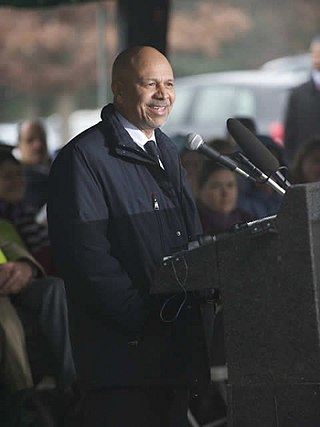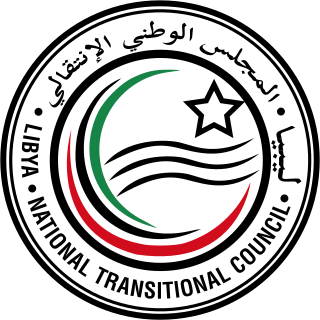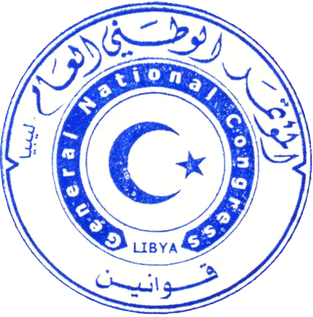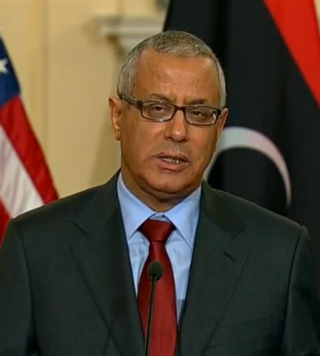Related Research Articles

Relations between Libya and the United Kingdom were initially close and positive after the British Armed Forces helped rebel forces to topple Muammar Gaddafi's regime in the 2011 Libyan Civil War. British officials have visited Libya several times since then,including two visits by Prime Minister David Cameron on which large crowds turned out to welcome him. The British Armed Forces are also helping to train Libya's National Army as part of wider cooperation on security matters. Security conditions have deteriorated since 2014,when the United Kingdom suspended operations from their embassy in Tripoli,into a second civil war. In June 2022,the United Kingdom re-opened its embassy in Tripoli.

Ali Suleiman Aujali is a Libyan diplomat who formerly served successively as Libya's ambassador to Malaysia,Argentina,Brazil and the United States. He served as ambassador under the Gaddafi government,Libya's National Transitional Council,and Libya's General National Congress. He declined the post of foreign minister under Prime minister Ali Zeidan in the government of the General National Congress.

The National Transitional Council of Libya,sometimes known as the Transitional National Council,was the de facto government of Libya for a period during and after the Libyan Civil War,in which rebel forces overthrew the Libyan Arab Jamahiriya of Muammar Gaddafi. The NTC governed Libya for a period of ten months after the end of the war,holding elections to a General National Congress on 7 July 2012,and handing power to the newly elected assembly on 8 August.

Ali Abdussalam Tarhouni is a Libyan economist and politician. Tarhouni served as the minister for oil and finance on the National Transitional Council,the provisional governing authority in Libya,from 23 March to 22 November 2011. He acted in the capacity of interim prime minister of Libya during the departure of outgoing incumbent Mahmoud Jibril from 23 October 2011 until Abdurrahim El-Keib was formally named to succeed Jibril on 31 October.

The aftermath of the First Libyan Civil War has been characterized by marked change in the social and political order of Libya after the overthrow and killing of Muammar Gaddafi in the civil war that was fought in Libya in 2011. The country has been subject to ongoing proliferation of weapons,Islamic insurgencies,sectarian violence,and lawlessness,with spillovers affecting neighboring countries including Mali.

Mustafa A. G. Abushagur is a Libyan politician,professor of electrical engineering,university president and entrepreneur. He served as interim Deputy Prime Minister of Libya from 22 November 2011 to 14 November 2012 in Abdurrahim El-Keib's cabinet and was briefly elected to succeed El-Keib as Prime Minister in 2012,before failing to receive congressional approval for his cabinet nominees and being removed from office.
The Justice and Construction Party (JCP) or Justice and Development Party is a political party in Libya associated with the Muslim Brotherhood. It was officially founded on 3 March 2012 in Tripoli.

Mustafa Jassem Al-Shamali is a Kuwaiti politician who has had held different cabinet posts. He served as Minister of Finance between 2007 and May 2012. He also served as oil minister from 4 August 2013 to January 2014.

The General National Congress or General National Council was the legislative authority of Libya for two years following the end of the First Libyan Civil War. It was elected by popular vote on 7 July 2012,and took power from the National Transitional Council on 8 August.

Ali Zeidan is a former Prime Minister of Libya. He was appointed by the General National Congress on 14 October 2012,and took office on 14 November after Congress approved his cabinet nominees. Prior to the Libyan Civil War,Zeidan was a Geneva-based human rights lawyer and according to the BBC,he is considered by some local observers as a strong-minded liberal. He was ousted by the parliament committee and fled from Libya on 14 March 2014. However,he told the press conference in Rabat,Morocco,that the ousting was invalid.

The cabinet was selected by Prime Minister Ali Zeidan on 30 October 2012 and was approved by the General National Congress on 31 October 2012 together with approving Zidan as Libya's first post-war Prime Minister. The cabinet is composed of the following ministers:Two women were selected to cabinet,and select ministries went to political independents who were not associated with any party.

Nasser Judeh is a Jordanian politician who served as Jordan's longest serving minister of foreign affairs,having served between 2009 and 2017 in eight consecutive governments. He also served as deputy prime minister from 2015 to 2017. He serves as a senator in the Jordanian Upper House of Parliament.
Sadiq Abdulkarim Abdulrahman is a Libyan physician and politician who served as first deputy prime minister between 14 November 2012 and 29 August 2014.

Mohamed Abdelaziz is a Libyan politician who served as the foreign minister of and chairman of the Arab League council of ministers from January 2013 to August 2014.
Abdulbari Al Arusi is a Libyan engineer and politician who served as oil and gas minister of Libya from 14 November 2012 until 22 January 2014.
Ashour Suleiman Shuwail is a retired Libyan security officer who served as the minister of interior in the cabinet that was formed after the first democratic elections in July 2012.
Salah Bashir Marghani is a Libyan jurist,and the former justice minister in the post-civil war government of Libya. He was part of Prime Minister Ali Zeidan's initial cabinet and took office on 14 November 2012.
The 2013 Libyan coup d'état attempt was a coup d'état attempt by a group of members of the General National Congress to take control of the country from Libyan Prime Minister Ali Zeidan. Zeidan was kidnapped in the early hours of the 10 October by armed gunmen and was then released several hours later after a pro-government militia stormed the site where he was being held. Following his release Zeidan claimed the incident was an attempted coup orchestrated by two militias in line with members of the GNC opposed to Zeidan.

Abdullah al-Thani is a Libyan politician who became prime minister of the House of Representatives of Libya on 11 March 2014,when he took over in an interim capacity after the dismissal of Ali Zeidan. He was previously the defence minister in the government of Zeidan.
Usama Siala is a Libyan politician who served as the Minister of Communications and Information Technology from January 2013 to August 2014. The cabinet was selected by Prime Minister Ali Zeidan on 30 October 2012 and was approved by the General National Congress on 31 October 2012. Siala's term as Minister of Communications and Information Technology ended when the cabinet resigned on 29 August 2014. He was then reinstated as President of General Telecommunications and Information Authority on 22/09/2014.
References
- ↑ "Curriculum Vitae of Ali Zeidan's government ministers". Libya Herald. 3 November 2012. Retrieved 17 February 2013.
- ↑ "The Curriculum Vitae". LBBC. Archived from the original on 29 March 2013. Retrieved 17 February 2013.
- ↑ "Background Information" (PDF). UK Border Agency. Retrieved 17 February 2013.
- ↑ "Libya government resigns to allow new cabinet". Al Jazeera. 29 August 2014. Retrieved 28 August 2014.